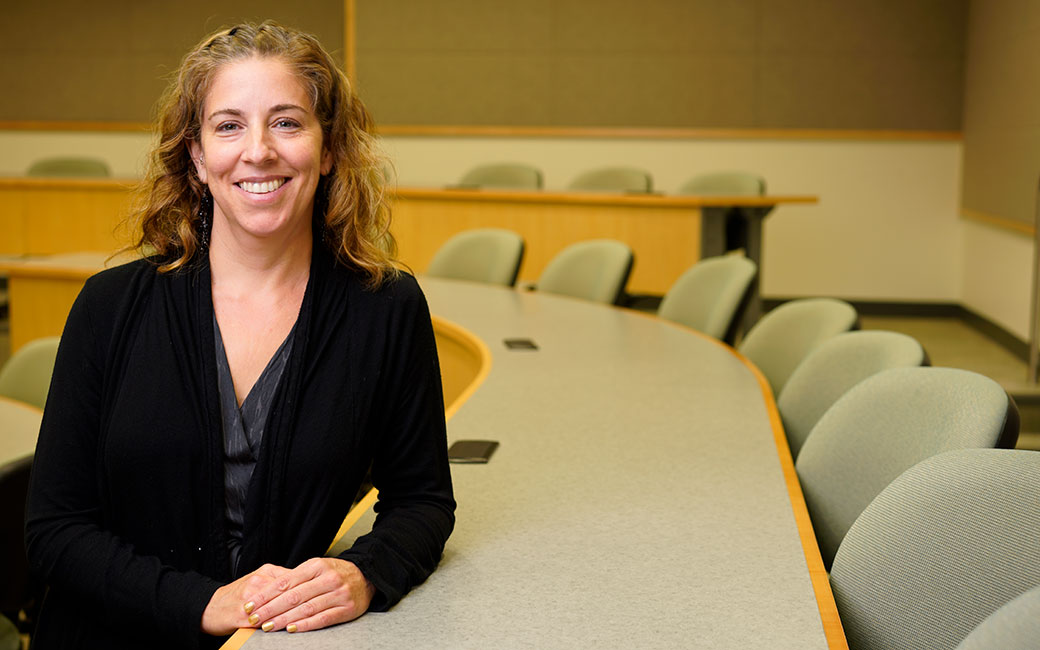Associate professor awarded fellowship to develop center for returning citizens at TU
As an Open Society Institute Community Fellow, Associate Professor Elyshia Aseltine will build on existing partnerships to open the Fair Chance Higher Education center on campus
By Rebecca Kirkman on December 6, 2019

Towson University is on its way to becoming a leader in supporting returning citizens on their journey to higher education and productive careers.
Last month, Associate Professor Elyshia Aseltine was named to the 2019 cohort of Open Society Institute—Baltimore Community Fellows. With the fellowship, which provides $60,000 over 18 months, Aseltine will work to establish the Fair Chance Higher Education center at TU. The center will support criminal justice system-impacted people in their pursuit of higher education.
Funding projects that address problems in Baltimore’s underserved communities, OSI—Baltimore chose its 10-member 2019 cohort from more than 150 applicants.
Aseltine’s work in local criminal justice reform and education began shortly after her arrival to the College of Liberal Arts’ Department of Sociology, Anthropology and Criminal Justice in fall 2012.
With the support of Dean Terry Cooney, Aseltine and professor Michelle Manasse were trained in the international Inside Out Prison Exchange Program, which brings incarcerated students and college students together for a semester-long course held inside a correctional institution. The first class was held at the Baltimore County Detention Center in the summer of 2014.
Since then, the program and Aseltine’s ambitions have grown with the support of BTU—Partnerships for Greater Baltimore.
“I had all of these experiences where education and incarceration overlapped,” Aseltine recalls. “And then when the BTU investment opportunity came up, I started wondering, How might I be able to connect all of these parallel paths in some way?”
With a 2018 – 2019 emerging investment through BTU and support from the Provost’s Office and the College of Health Professions and the College of Fine Arts and Communication, 11 faculty have now been trained to teach Inside Out courses at the Baltimore County Detention Center and the Harford County Detention Center. The first class at the Volunteers of America Chesapeake Residential Re-Entry Center in East Baltimore will be held in the spring term.
The BTU investment allowed Aseltine to initiate conversations on campus about criminal justice reform, and she began to wonder about ways to further the university’s support of returning citizens.
In 2019, she was awarded a priority investment through BTU, enabling her to develop a network throughout the university that will remove barriers and build support for students with criminal records on campus.
“My big vision is ultimately to have a physical center on campus,” Aseltine says. The Fair Chance Higher Education center aims to provide support in three areas: assistance navigating higher education from interest to completion, a pipeline to potential career opportunities at TU and elsewhere, and advocating for the formerly incarcerated on campus and throughout the community.
“Professor Aseltine’s outstanding work demonstrates the positive and lasting impact that can happen when a committed faculty member with a good idea is given the resources to engage with the community both on and off campus,” says Provost Melanie Perreault. “She and her colleagues are making a real difference.”
Aseltine credits BTU for elevating her personal passion to an institutionally supported partnership making a difference in the Baltimore region. It’s that support, she says, that made the OSI fellowship possible.
“The work Dr. Aseltine undertakes embodies both the mission of the university and the community engagement component of the BTU presidential priority,” says Matthew Durington, professor of anthropology and director for community engagement and partnerships within the Division of Strategic Partnerships and Applied Research.
“The work with returning citizens has been supported by BTU because it promises to make a significant impact in the Baltimore region by providing points of access for this population. The capacity to transform lives and communities is huge, and the fact that OSI recognizes this demonstrates that the BTU priority is recognizing and emboldening the great work of our faculty.”
Aseltine hopes to make Towson University a model for supporting returning citizens within the University System of Maryland, and one that could be easily replicated throughout the country.
“Mass incarceration is such a prevalent issue in Baltimore City. It’s an issue of criminal justice and, more broadly speaking, economic and social justice,” Aseltine says. “What we’re doing is one part of a multipronged strategy. Higher education won't necessarily make sense for everybody that's coming out of prison. But for those for whom it makes sense, Towson can play a deliberate part in facilitating their success.”
This story is one of several related to President Kim Schatzel’s priorities for Towson University: TU Matters to Maryland, BTU-Partnerships at Work for Greater Baltimore and Diverse and Inclusive Campus.